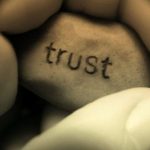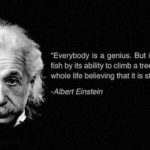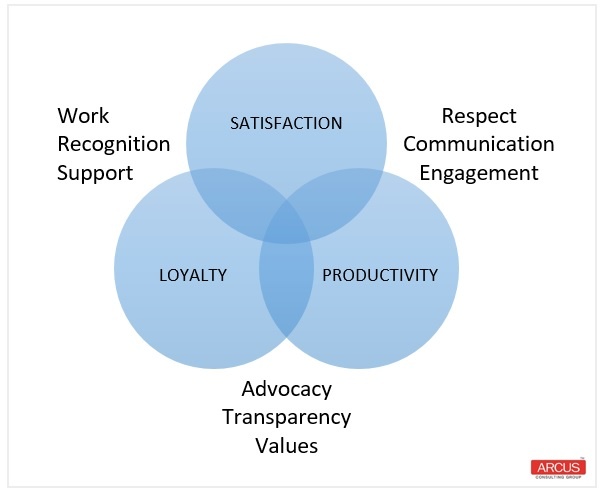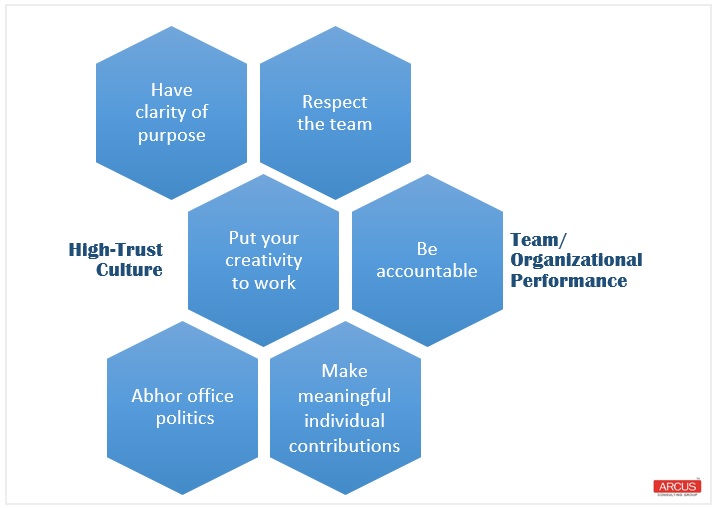Building Trust: “We need people in our lives with whom we can be as open as possible. To have real conversations with people may seem like such a simple, obvious suggestion, but it involves courage and risk.” –Thomas Moore
 Many leaders can attest to this experience: You ask your team to carry out a task that has enough flexibility for creative input. Rather than making their own decisions, the team comes to you with an onslaught of questions, trying to pin down the exact parameters of the task.
Many leaders can attest to this experience: You ask your team to carry out a task that has enough flexibility for creative input. Rather than making their own decisions, the team comes to you with an onslaught of questions, trying to pin down the exact parameters of the task.
 The reason for this behaviour is a lack of trust or possibly gaps in competencies. The latest results of the Arcus Trust Index survey indicate that trust in business in Canada has declined precipitously by 12 points to 42% over the past year. We haven’t seen a 12-point dip in the Arcus Index (that includes 55 dimensions of trust) since the Enron days. People simply don’t trust others like they used to. What is driving the drop in the Index? Is it a temporary blip? Will it impact our organization’s reputation? How can leaders strengthen their organizational culture to improve their performance? These are frequent questions posed to Arcus by Business Leaders.
The reason for this behaviour is a lack of trust or possibly gaps in competencies. The latest results of the Arcus Trust Index survey indicate that trust in business in Canada has declined precipitously by 12 points to 42% over the past year. We haven’t seen a 12-point dip in the Arcus Index (that includes 55 dimensions of trust) since the Enron days. People simply don’t trust others like they used to. What is driving the drop in the Index? Is it a temporary blip? Will it impact our organization’s reputation? How can leaders strengthen their organizational culture to improve their performance? These are frequent questions posed to Arcus by Business Leaders.

Arcus surveyed 218 CEOs recently to understand the key drivers of trust in organizations and its impact on employee loyalty, motivation, performance and culture. CEOs say trust is the top driver of a performance driven organizational culture. How employees operate and exchange information either strengthens or erodes trust. It is clear that bureaucracy generally exists where trust doesn’t. A lack of trust also thrives in organizations that rely heavily on process and in workplace environments that have an underdeveloped capacity for distributed leadership.
How can CEOs strengthen trust in context of organizational dynamics? CEOs who have been successful in building trust in their workplaces say that it starts at the top of the organization. If a CEO is transparent and accessible, it demonstrates a capacity of leadership to lead by example. Below is a model that has worked quite effectively for most CEOs. The Arcus Culture Change and Employee Satisfaction model connects a comprehensive set of indicators in a seamless process that includes over 2000 actions that CEOs and team leads can take to strengthen their organization’s culture. Simple actions such as spending a few minutes a week checking in on groups (or individual employees) can change an organization.

How do employees articulate trust in the workplace?
Frequent questions from employees include “do I belong?” and “Can I grow?”. Two variables to consider when assessing trust include employee satisfaction from the job and commitment to the organization. Unfortunately, most organizations conduct annual “satisfaction surveys” that employees criticize privately as being ineffective and not leading to tangible changes in the workplace. These surveys include boiler plate NPS (net promoter score) questions such as “would you recommend your organization to a friend?” without digging deeper into more meaningful and actionable drivers of satisfaction related to culture, process and people archetypes within the organization.
A more comprehensive approach would include a best practice model that looks at what information is collected and how often it is collected. Tracking best practice indicators of trust and satisfaction would serve two goals: first, provide authentic feedback from employees in a meaningful context that employees will respect and second, connect the results with the strategic imperatives of the organization. The satisfaction survey formats that most organizations use are likely to fall short on achieving these two goals.
Below are some of the ways employees articulate trust in their organizations.

- Have clarity of purpose: What is my role? Am I making a difference? Employees say that one of the top drivers of trust is clarity of purpose – an understanding that employees can do their job without second guessing the intent of others. This will help organizations reduce excessively bureaucratic processes and oversight.
- Respect the team: This means respecting the skills and views of team members, understanding their goals and roles within the organization. In a high-trust environment, everyone knows that good alignment on goals leads to success. A belief that the entire team wins when empowered and interconnected people respect each other and work together.
- Be accountable: In today’s workplace, employees want a culture that is transparent, direct and honest. It helps to ensure a high level of accountability- which means that when things go wrong or mistakes are made, team members are quick to take responsibility and learn from the mistakes. This is called a “blameless” culture in high risk workplaces such as healthcare and nuclear energy where hiding mistakes can have catastrophic consequences. In high performance environments, people aren’t afraid to fail, and respect others who share their failures.
- Put your creativity to work: Trust thrives in an environment where people are free to express themselves and can share their passion for innovation. Such environments abhor micro-managers- people who always want to be in control and are never confident in their team’s capacity to innovate. Arcus research indicates that a feeling of being trusted has an enormous impact on employee motivation and effective team work.
- Abhor office politics: Insecure work environments are rife with “office politics” where departments work in ‘silos” and information is withheld, decisions aren’t made, and constant infighting leads to slow progress. High-trust teams generally have leaders who communicate constantly with teams above, below and around them. Their primary goal is to address gaps in information and processes.
- Make meaningful individual contributions. People want to know that they can make a difference. When individual contributions to a larger initiative are recognized, it is highly motivating and recognizes that the individual has made a difference. Nothing motivates people more that knowing that their contribution is valued and their hard work has made a measurable difference.
What erodes trust in the Workplace?
First, media coverage of trust related issues doesn’t just impact the entity in the news. It impacts the broader view of consumers, employees and stakeholders. Wikileaks, cyber data breaches, VW’s recent emissions claims, and the Occupy movement are just some of the complex influencers of the public trust. For example, recent negative news coverage in some sectors, especially the Automotive sector has not helped. VW, for example, has been in the news for installing defeat devices in many of its vehicles, which has misled owners into thinking their vehicles have relatively lower emissions. The premise on which these customers were motivated to buy the vehicles was false. Customers are more likely to question the credibility of all Automotive brands today.
Second, how an organization treats its employees can significantly strengthen or erode overall trust. Job security in the workplace has declined significantly over the past three years. A third of employees say they are afraid of being laid off within the next twelve months. This perception can be distracting and is likely to erode employee productivity resulting in lower customer satisfaction. Employees are unlikely to endorse their employer if they don’t trust it. Confidence in employee rights is one of the most important drivers of trust among consumers, second only to protecting customer data.
Third, there is a growing divide between the beliefs of people and the perceived behaviour of government, media and organizations at large. The definition of good behaviour is a complex matter and opinions differ widely, depending on who you talk to. However, it is clear that the bar has been raised on the threshold of earned trust. Consumers want to see independent endorsements of claims from credible sources and expect evidence of both personal and societal benefits of actions of business leaders. They are most likely to trust the opinions of friends, family, and academic experts. Interestingly, family-owned businesses are among the most trustworthy.
What strengthens trust and how can it be measured?
Leaders today need to recognize the importance of integrating trust indicators in their strategic plans. It is arguably one of the most important influencers of a growth or reputation augmenting strategy. Customers like or dislike entities depending on how much they trust them. Their perception plays a critical role in whether they believe in advertising claims. While significant resources are invested in tracking customer satisfaction, not enough is done to track trust – a simple measure that encompasses so many variables that drive purchases.
There is also a significant opportunity for Business Leaders to lead the debate on social issues to build trust. Many issues such as education, healthcare and philanthropy are important to consumers. A positive viewpoint on issues that matter can build trust not only in the leader but also strengthen the reputation of the organization that the leader represents. The strategy may include engaging external ambassadors and deepening relationships with employees, depending on which of the 55 dimensions of trust they would like to strengthen. After all, nothing is more powerful than knowing your opinion is trusted.
Contact Arcus for a presentation on key findings from the study on building trust in the workplace.
